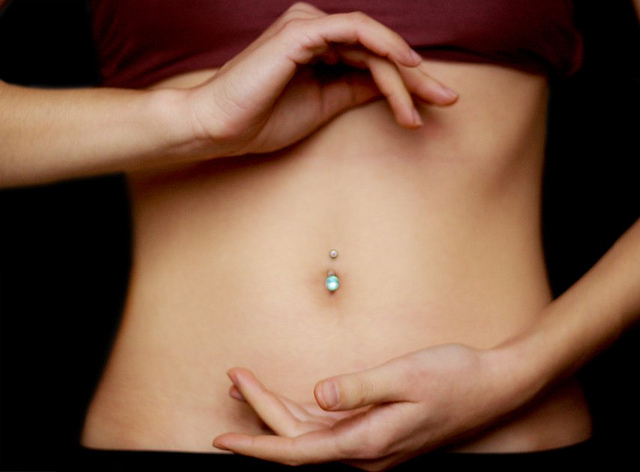
I grew up like every other kid in the 80s, eating fruit roll ups and other processed foods, not thinking anything of it because that’s what was served at snack time and every birthday party.
Little did I know the reason I was struggling with digestive issues was because of what I was eating. I struggled with Irritable Bowel Syndrome (IBS) for the first 20 years of my life until I realized that many of the foods I was eating were triggering my unwanted, awful symptoms.
Trust me, if you told me that a certain food was causing me to have health issues, I wouldn’t have believed you—I probably would have laughed. I didn’t understand the connection between what we put in our mouths and what manifested as yucky symptoms in our bodies.
In my 20s, I started suffering from sinus pressure, seasonal allergies, reoccurring colds and exhaustion, which was the start to my journey of 10 years of chronic illness. Little did I know, many these symptoms were connected to my microbiome. Each of us has a unique eco-system in our bodies, also known as the “microbiome,” that houses more than 100 trillion microbes. What many people don’t realize is that the number of microbes we have outnumbers the amount of cells we have in our body.
So, what are these microbes doing in our bodies and how can they keep us healthy, help us fight inflammation and keep our weight in check?
The majority of these microbes are located in our “gut,” helping us detox on a daily basis from the toxins we are bombarded with (from car exhaust to chemicals in our tap water and toothpaste to pesticides in fruits and veggies as well as growth hormones in factory farmed animal products). We have a mix of good and bad bacteria in our guts and it’s important to keep our gut flora balanced so that these microbes can help control inflammation in our body and keep us from gaining weight. This is why probiotics have recently become so popular, because they are good bacteria for our guts, and since the majority of our immune system is located in our gut, a healthy gut means a healthy body.
I’ve spent the last 10 years healing my body from chronic illness. Everything from Lyme disease to C-diff colitis to Hypothyroidism, Candida and more. I learned how to get my body working for me, not against me. As I explain in my new cookbook, Eating Clean: The 21-Day Plan to Detox, Fight Inflammation, and Reset Your Body, the gut is at the root of our health.
Seeing over 500 doctors and being diagnosed with numerous health issues, I realized that in order to get to the root cause of our health issues and symptoms, we have to address our gut health first.
In my 20s I thought it was normal to be bloated, have indigestion, diarrhea and constipation—and sadly, the average person thinks this is normal, as well. But it’s not. Our bodies were built to feel amazing every day. Many of us accept too low a quality of life—and it’s not okay! We were built to feel amazing and not deal with these pesky symptoms that pop up in our lives.
Many of my clients don’t realize how bad they actually feel until they start healing their gut and changing the way they are eating. The main goal is to balance your gut flora, eliminate inflammatory foods, heal your gut lining and reduce environmental toxins as much as possible.
If you’re dealing with any of the below symptoms, it’s important to work with a Functional M.D. (someone who will address the root cause of your symptoms) to understand the underlying imbalances in your gut to support your immune system and overall health.
- Brain fog (ongoing or after you eat)
- Seasonal allergies
- Asthma
- Acne
- ADD or ADHD
- Rashes
- Eczema
- Bloating after you eat or between meals
- Heartburn
- Chronic fatigue
- Candida or yeast infections (Athlete’s foot, etc.)
- Diarrhea and/or constipation
- Autoimmune disease
Here are a few ways to support your microbiome on a daily basis:
- Eat Clean. In my new book, Eating Clean, I talk about the importance of detoxing our body daily by eating whole foods. It’s important to remove processed foods from your lifestyle as well as inflammatory foods such as gluten, dairy, soy, sugar and refined table salt as well as non-organic animal products (such as conventional milk, cheese, meat, poultry, eggs), which are full of antibiotics and growth hormones. These foods can create inflammation, allergens and other negative effects in our body, increasing our risk for unwanted symptoms. Eating foods like raw walnuts, leafy greens, ground flaxseeds, avocado and berries are anti-inflammatory and great options to eat every day.
- Remove Pathogens. It’s important to work with a Functional MD to remove the bad bacteria, parasites and yeast in your gut. Think of this removal like pulling out the weeds in your garden: you have to get rid of the bugs before you can plant the flowers (probiotics and prebiotics).
- Drink Filtered Water. Drink filtered water throughout the day instead of tap water to avoid anything that could be lurking in your tap water that can do more harm than good for your gut health.
- Eat More Green Veggies. It’s important to feed our microbiome by eating more dark leafy green veggies, which keep the health of our microbiome balanced. Leafy green veggies are a great way for us to feed our good bacteria so they can keep us healthy. Plus, they’re full of fiber and nutrients to fuel our bodies.
- Focus on the Good Bacteria: Probiotics. Taking a high quality probiotic will fill your microbiome with good bacteria to help your immunity and digestion. Look for probiotics that contain a variety of strains of Bifidobacteria and Lactobacillus. Talk to your Functional medicine doctor about what strains of good bacteria are right for your body.
- Eat Prebiotic and Probiotic Rich Foods. Add in good bacteria to promote healthy gut flora by eating probiotic and prebiotic rich foods and drinks. You’ve probably heard of eating probiotic rich foods such as chickpea miso, kombucha, pickled veggies, kimchi and coconut water kefir that feed your microbiome, but it’s equally as important to feed your gut prebiotic rich foods that are non-digestible short-chain fatty acids that help feed your good bacteria. Garlic, asparagus, jicama, chicory root, dandelion greens, gluten-free oats and onions are great examples of prebiotic-rich foods that feed your gut flora, which nourish the cells in your body.
Author: Amie Valpone
Image: Daniela Vladimirova/Flickr
Editor: Emily Bartran










Read 0 comments and reply